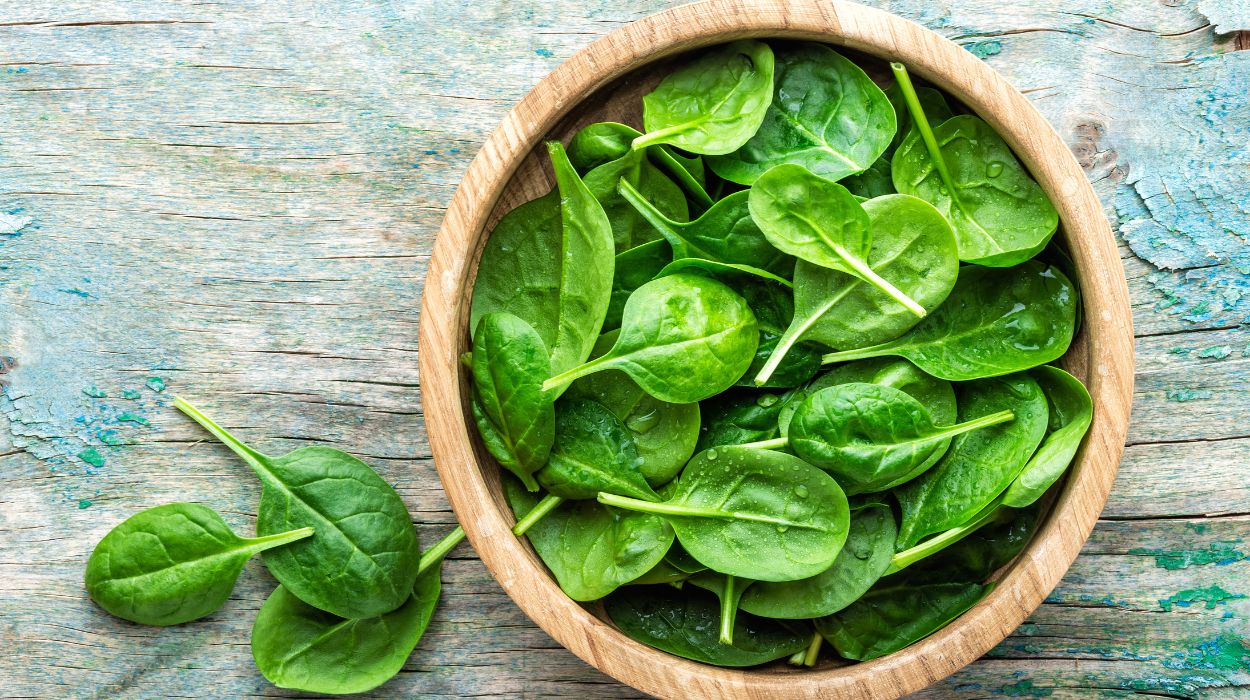 Expert's opinion
Expert's opinion
Expert's opinion
The article is a subjective view on this topic written by writers specializing in medical writing.
It may reflect on a personal journey surrounding struggles with an illness or medical condition, involve product comparisons, diet considerations, or other health-related opinions.
Although the view is entirely that of the writer, it is based on academic experiences and scientific research they have conducted; it is fact-checked by a team of degreed medical experts, and validated by sources attached to the article.
The numbers in parenthesis (1,2,3) will take you to clickable links to related scientific papers.
8 Benefits Of Spinach & Nutrition Facts In 2024

There are several reasons why fresh spinach is considered a superfood. But unfortunately, there is no standard as to how to classify a food as a superfood. Instead, it’s a generalized term for foods rich in vitamins, minerals, fiber, and other essential nutrients beneficial to health.
Eating spinach has many benefits, such as improved cardiovascular, cognitive, eye, and digestive health and reduced oxidative stress. Read on to find out the top benefits of spinach and how to incorporate it into your diet.
8 Health Spinach Benefits
- Good for eye health
- Boosts energy levels
- Support healthy heart
- Boost immune system
- Support brain health
- Prevent disease
- Aid weight loss
- Promote skin health
8 Amazing Benefits Of Spinach

So what are the benefits of spinach? It turns out there are a variety of spinach health benefits ranging from improved eye, skin, and cardiovascular health. Here are a few reasons why spinach should be a priority in your diet.
Good For Eye Health
Spinach contains two different antioxidants that promote eye health – lutein and zeaxanthin. These powerful antioxidants support your vision[1] by
- Decreasing eye inflammation
- Protecting against cell damage in the eyes
- Improving or even preventing age-related macular disease
- Reducing glare damage
- Protecting from UV light damage
- Helping to filter blue light
- Lowering your risk of long-term eye conditions (ex. cataracts)
Spinach is also high in vitamin A, which also plays a role in eye health. For example, vitamin A supports[2] the small membranes in the conjunctiva. The conjunctiva is what covers the inside of the eyelids and surrounds the white part of the eye.
Vitamin A helps these areas of the eye by fighting free radicals that cause chronic inflammation and neutralizing the damage they cause. Vitamin A also helps filter out blue light and UV light. All these functions can reduce the risk of cataracts and macular degeneration.
Boosts Energy Levels
Spinach is also a wonderful source of plant-based iron. Iron is essential in the process and transportation of red blood cells. Red blood cells are mainly known for carrying oxygen throughout the body and producing energy through DNA synthesis.
Iron is lost from the body through exertion and the loss of blood. According to research, about one-third of the world’s population is iron deficient.
If you are low in iron, side effects include
- Tiredness
- Weakness
- Pale skin
- Dizziness
- Lightheadedness
- Cold hands and feet
- Headache
- Brittle nails
Spinach is a good vegan source of iron, with almost 20% of your daily needs in 1 cup. Add it to your breakfast smoothie, and you won’t even taste it. If you want to absorb[3] even more iron, try cooking or blanching the leafy greens before eating them.
Spinach possesses oxalic acid, which blocks the absorption of iron. However, oxalic acid breaks down when heated, allowing iron to become more absorbable.
Vitamin C also improves iron absorption, so combining spinach with vitamin C-rich foods[4] like citrus fruits, tomatoes, or bell peppers is also beneficial.
Support Healthy Heart
Spinach is additionally naturally high in nitrates, compounds that help improve blood flow. They do this by softening stiff blood vessels and helping to widen them.
If there is plaque buildup in the arteries, it can cause less blood to flow through them. This is the number one cause of heart attacks and strokes. Studies[5] have shown that nitrates may help the rate of survival after a heart attack by 32 percent.
Not only is spinach good for your heart health, but it could potentially become a part of your heart in the future.
In 2017[6] issue of the journal Biomaterials, researchers successfully dissolved a spinach leaf’s cells (leaving the plant’s veins) and then implanted those veins with human heart stem cells. After a few days, the cells began to beat on their own. They continued beating for three weeks.
The implications of this research are exciting. For example, spinach leaves could help to build functioning human heart tissue. Physicians could then use this tissue to help repair hearts damaged from a heart attack.
Boost Immune System

Spinach also contains magnesium and vitamin E, which are necessary for over[7] 300 different roles within your body. These functions range from helping keep your bones healthy to maintaining a consistent heartbeat. Magnesium is especially vital in keeping your immune function strong.
Additionally, the vitamin A found in spinach helps to strengthen your respiratory system, intestinal tract, and mucus membranes. These areas of the body need to be supported continuously. This support is necessary because these areas are where germs initially enter the body and can be fought off before making you ill.
Magnesium helps support immune function by aiding white blood cells in finding and fighting off germs. On the other hand, low magnesium levels can cause your body to attack its cells instead of the germ cells.
Unfortunately, this causes high levels of inflammation, tissue damage, cell damage, and even narrowed arteries and vessels.
Support Brain Health
Spinach can also help protect your brain before you are born and as you age as a result of the folate present.
Folate (or folic acid) is a vitamin abundant in spinach. Preclinical research revealed the importance of pregnant women taking folate as it is essential for normal neurodevelopment and brain function in unborn children.
Some of the fetal development functions which require folate[8] include
- DNA synthesis
- Regulation of gene expression
- Synthesis of phospholipids
- Synthesis of neurotransmitters
- Maintenance of healthy blood amino acid concentrations
Folate also helps prevent spina bifida in infants. Research has shown that taking dietary supplements or consuming foods high in folic acid regularly reduces the risk of babies born with spina bifida by 70%.
Spinach can also help with cognition as we age. This is because spinach contains large amounts of vitamin K. Observational studies[9] show that higher vitamin K levels are associated with better cognitive function in older adults. This is thought to be because vitamin K is found in brain tissue.
Prevent Disease
Spinach is filled with antioxidants called polyphenols that help protect cells against free radicals (unstable molecules). These free radicals can cause oxidative stress on the body. Polyphenols help to fight oxidative stress and eradicate free radicals from the body.
Of note, if free radicals become too plentiful, they can cause heart disease, diabetes, and even cancer. Research[10] suggests that eating a diet rich in antioxidants (like the ones in spinach) can protect us from developing these diseases.
Moreover, polyphenols can improve the heart’s function by increasing the good cholesterol in our bodies (HDL) and decreasing the bad cholesterol (LDL) in our bodies. Additionally, consuming leafy green vegetable can decrease your cancer risk. According to the research, the carotenoids in spinach such as lutein[11] and beta carotene may stunt tumor growth.
Aid Weight Loss

Green leafy vegetables, including spinach leaves, have profound nutritional benefits if you are trying to lose weight. The benefits of spinach for weight loss are clear as it Spinach is very low in calories yet has high amounts of dietary fiber, vitamins, and minerals.
All these components combined mean that eating spinach will make you feel full without many calories, making it an ample choice if you are trying to lose weight. The high fiber content in spinach also helps to regulate blood sugar, a vital part of weight loss. Having good blood sugar control helps with weight loss.
When you ingest a large amount of sugar, your body produces a higher amount of insulin. As a result of insulin production, your body stops burning fat for energy and instead starts storing it. This makes losing weight difficult.
Oppositely, if your body has optimal blood sugar levels, it burns carbohydrates for energy instead of holding them as fat.
Promote Skin Health
Spinach also has nutritional benefits to help aid in healthy skin. One of the most common causes[12] of early aging in the skin is UV light damage.
A diet that is high in antioxidants such as carotenoids, vitamins C and E, and polyphenols protects against these harmful rays. Spinach contains all of these protective nutrients that promote skin health.
Acne is another skin condition in which spinach is helpful. Acne[13] is caused primarily by inflammation and excessive oil. Spinach is a potent anti-inflammatory as it contains several powerful antioxidants.
Besides consuming the leaves, you can grind them into a paste with a bit of water and use them directly on the skin as a face mask. After twenty minutes, remove the spinach face mask with warm water. This mask is a great way to rid the face of excess oils and decrease inflammation.
Spinach Nutrition Facts

Nutrition Facts are provided by the United States Department of Agriculture’s nutrient database[14]. The nutritional value is per 100 grams (3.3 raw cups) of baby spinach or mature spinach
- Calories: 25
- Protein: 3 grams
- Fat: 0.6 grams
- Carbohydrates: 2.6 grams
- Fiber: 1.6 grams
- Iron: 2.7 mg
- Folate: 116 µg
- Vitamin A: 306 µg
- Lutein + zeaxanthin: 7920 µg
Potential Side Effects
Consuming too much spinach may hurt some people’s health. Always be in contact with your wellness professionals or physicians before making any significant changes to your diet.
Spinach contains calcium and oxalate, which can cause calcium oxalate stones (kidney stones). If you are at a higher risk for developing kidney stones, be aware and cautious of how much spinach you ingest.
Spinach also contains high amounts of vitamin K, which can interact with blood clotting medications (blood thinners). Talk to your doctor before consuming spinach if you are on any blood thinning medication such as warfarin, coumadin, or heparin.
Lastly, spinach is very high in fiber, as stated previously. Ingestion of high-fiber foods can cause abdominal distress to your digestive system, such as bloating and gas if your body has not adjusted to consuming them regularly.
These symptoms are only temporary and should resolve as you regularly ingest high-fiber foods.
How To Eat Spinach In Your Diet?
Spinach has a very subtle flavor, making it an ideal choice to add to many dishes and snacks. Here are a few ways to add spinach to your diet
- Add a handful to your fruit smoothies
- Add a handful to hot soups
- Mix into pasta sauces
- Mix into your breakfast omelet
- Place on top of pizza
- Bake into loaves of bread
- Replace your regular lettuce with spinach
The benefits of raw spinach blended into a smoothie versus cooked spinach by sauteing are the same as cooked spinach. Actually, in some circumstances, the important plant compounds in spinach are better for your health than when eaten raw.
The Takeaway: Is Spinach Good for You?
So as you can see, eating spinach every day has many health benefits. To summarize, spinach helps your entire body function more effectively. This is because spinach is loaded with a multitude of nutrients.
The best part about spinach is you can easily add it to almost any dish, and you probably won’t even know it’s there because of its subtle taste. So try adding it to your dishes today for a more healthy tomorrow.
+ 17 sources
Health Canal avoids using tertiary references. We have strict sourcing guidelines and rely on peer-reviewed studies, academic researches from medical associations and institutions. To ensure the accuracy of articles in Health Canal, you can read more about the editorial process here
- Buscemi, S., Corleo, D., Di Pace, F., Petroni, M.L., Satriano, A. and Marchesini, G. (2018). The Effect of Lutein on Eye and Extra-Eye Health. Nutrients, [online] 10(9), p.1321. doi:10.3390/nu10091321.
- Shumway, C.L., Motlagh, M. and Wade, M. (2021). Anatomy, Head and Neck, Eye Conjunctiva. [online] Nih.gov. Available at: https://www.ncbi.nlm.nih.gov/books/NBK519502/
- Aoa.org. (2020). Vitamin A beneficial for eyes, just not for preventing myopia. [online] Available at: https://www.aoa.org/news/clinical-eye-care/health-and-wellness/vitamin-a-good-for-the-eyes?sso=y
- Vic.gov.au. (2014). Iron and iron deficiency – Better Health Channel. [online] Available at: https://www.betterhealth.vic.gov.au/health/conditionsandtreatments/iron
- Mayo Clinic. (2022). Iron deficiency anemia – Symptoms and causes. [online] Available at: https://www.mayoclinic.org/diseases-conditions/iron-deficiency-anemia/symptoms-causes/syc-20355034
- Chai W;Liebman M (2014). Effect of different cooking methods on vegetable oxalate content. Journal of agricultural and food chemistry, [online] 53(8). doi:10.1021/jf048128d.
- Li, N., Zhao, G., Wu, W., Zhang, M., Liu, W., Chen, Q. and Wang, X. (2020). The Efficacy and Safety of Vitamin C for Iron Supplementation in Adult Patients With Iron Deficiency Anemia: A Randomized Clinical Trial. JAMA network open, [online] 3(11), p.e2023644. doi:10.1001/jamanetworkopen.2020.23644.
- Held, P. (1992). Effects of nitrates on mortality in acute myocardial infarction and in heart failure. British journal of clinical pharmacology, [online] 34 Suppl 1(Suppl 1), pp.25S28S. doi:10.1111/j.1365-2125.1992.tb04145.x.
- Crossing kingdoms: Using decellularized plants as perfusable tissue engineering scaffolds. (2017). Biomaterials, [online] 125, pp.13–22. doi:10.1016/j.biomaterials.2017.02.011.
- National Institutes of Health (2016). Office of Dietary Supplements – Magnesium. [online] Nih.gov. Available at: https://ods.od.nih.gov/factsheets/Magnesium-HealthProfessional/.
- Naninck, E.F.G., Stijger, P.C. and Brouwer-Brolsma, E.M. (2019). The Importance of Maternal Folate Status for Brain Development and Function of Offspring. Advances in nutrition (Bethesda, Md.), [online] 10(3), pp.502–519. doi:10.1093/advances/nmy120.
- Spina Bifida Association. (2019). Folic Acid – Spina Bifida Association. [online] Available at: https://www.spinabifidaassociation.org/resource/folic-acid/
- Alisi, L., Cao, R., De Angelis, C., Cafolla, A., Caramia, F., Cartocci, G., Librando, A. and Fiorelli, M. (2019). The Relationships Between Vitamin K and Cognition: A Review of Current Evidence. Frontiers in neurology, [online] 10, p.239. doi:10.3389/fneur.2019.00239.
- Spinach and Health: Anticancer Effect. (2010). Sciencedirect.com, [online] pp.393–405. doi:10.1016/B978-0-12-374628-3.00026-8.
- Black, H.S., Boehm, F., Edge, R. and Truscott, T.G. (2020). The Benefits and Risks of Certain Dietary Carotenoids that Exhibit both Anti- and Pro-Oxidative Mechanisms-A Comprehensive Review. Antioxidants (Basel, Switzerland), [online] 9(3), p.264. doi:10.3390/antiox9030264.
- Fernández-García, E. (2014). Skin protection against UV light by dietary antioxidants. Food & Function, 5(9), p.1994. doi:10.1039/c4fo00280f.
- Usda.gov. (2022). FoodData Central. [online] Available at: https://fdc.nal.usda.gov/fdc-app.html#/food-details/1999632/nutrients



